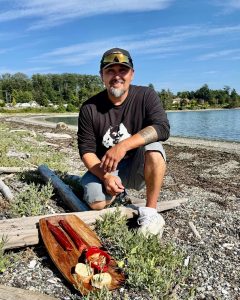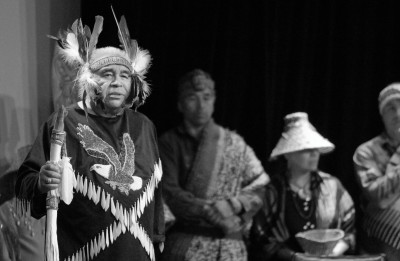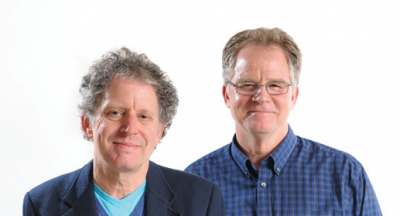Since Time Immemorial is a recurring series featuring community members whose families have been here since time immemorial. The ancestral knowledge carried by Lhaq’temish, Nooksack, and other Coast Salish peoples is knowledge about how to live in our shared home in a good, life-sustaining way. We live in a time when we need to restore our relationship with Mother Earth and with one another. We are grateful for these stories, told in the words of each featured individual.

Photograph by Julie Trimingham
Squad’dam’a’hon Terry Phair is a Lummi Nation tribal member, commercial fisher, diver, current board member of SeaFeast, and owner of the Lummi Seafood Market. The market sells fresh, frozen—and their own “Salmon Woman” canned—fish and seafood at their store in Ferndale, Squalicum Harbor Dockside, and the Bellingham Farmers Market. Their Čha•k’os Fire Pits—where they cook salmon in the traditional Coast Salish way—can be found at events throughout the area. linktr.ee/lummiseafoodmarket
Squad’dam’a’hon is an Indian name that was put on me by late Hereditary Lummi Chief Tsi’li’xw William (Bill) James. I share that name with my son, Jaden Phair-Williams, Squad’dam’a’tud. The name comes from the Snoqualmie, the moon people, and carries a gift of salmon. My younger son, Sky Phair-Williams, he carries the name Chi’yad’Kanim. On what we have recorded, Chi’yad’Kanim was the brother of Squad’dam’a’hon, and their mom and dad were the first ones here in this place. So these names are thousands of years old. Late Bill gave my partner Laura Williams the name Plelaelut, which is tied to reef netting. We’re all close to salmon. Late Bill told me the teaching is that we can’t be dragging our names in the dirt. We have a responsibility to be good people, to do our best to keep salmon close to our people.
Your business, Lummi Seafood Market, is part of keeping the salmon close?
It’s one more way for us to get salmon for our ceremonies, and it’s one more way for Lummi and other tribes, for all of Bellingham, to access healthy salmon. I harvest salmon and seafood, and I also buy from Lummi and other tribal and local fishers. We all work together to make sure everybody can enjoy this beautiful protein.
How did you get started in fishing?
My dad and uncles were full-time fishermen, so I got to spend my childhood fishing for salmon at Point Roberts. That’s how I’d pay for school clothes and how I bought my first vehicle. But I didn’t realize how special salmon was until I got a bit older. Our family spent a lot of time apprenticing with late Bill James, and that’s when I started understanding how important it is to have salmon in our diet, to have canned salmon in our pantry, to be able to share with others.
You’re also a diver, yes?
I began my diving career on Johnny Felix’s boat, then I kind of hopped around and dove with almost everybody in the Lummi dive fleet. With diving, you either get good at it or you quit. A lot of people quit. There’s not too many divers left in Lummi anymore. Today, there’s five or six boats when there used to be about thirty. On my vessel now, we dive for geoduck, red sea cucumbers, red and green sea urchins, and other seafoods.
What’s it like down there, underwater?
We weigh ourselves down with heavy weights and wear boots, so we’re walking on the bottom of the Salish Sea. We walk around and harvest—we can go as far as a couple hundred feet away from the boat. We have a hose that’s hooked up to us; we’re breathing compressed air. We also have a backup oxygen tank on our back and comm wires to speak to each other. Sometimes, it’s too murky and you can’t see without a flashlight, but usually you can see five to ten feet away. You have to be careful, check your dive gear, not take too many risks, not be greedy. I was taught by Steve Solomon that the first thing you do when you’re leaving home and you’re getting ready to jump on your boat: you pray that you make it home safe.
I’m always impressed by how much you need to know, all the skills you need to have, to harvest the sea in a good way. It’s hard work.
We spent a lot of time with late Bill, and I remember asking his mom, Auntie Fran, “What is it to be a Lummi? What did the old people say?” And she always said, “To be Lummi is to be a hard worker.” She and late Bill were really hard workers, always keeping their minds and hands busy, and always teaching.
You brought out this beautiful platter of smoked salmon for us to nibble on, and throughout our conversation you’ve talked a lot about sharing.
Our people, long time ago, were a potlatch society, we shared resources and gifts with one another. The wealthiest person was the one that could share the most—not the one that could fill up his bank account, but the one that could share with all the villages and make sure everybody had enough food, blankets, and other resources. We need to return to these ancestral ways and practice them on a day-to-day basis. Back then, we always worked together. This world, this western civilization we live in now, could benefit from those kinds of teachings. As Chief Sealth said, “We cannot eat money.”
Hy’shqe, Terry!
Julie Trimingham is a mother, writer, and non-tribal member of the Sacred Lands Conservancy (SacredSea.org), a Lhaq’temish-led non-profit dedicated to protecting Native sovereignty, treaty rights, sacred sites, and the life and waters of Xw’ullemy (the Salish Sea bioregion). Her heart is filled by the work to protect and promote ancestral place-based knowledge so that we can all learn to live here, with one another, and with Mother Earth, in a good way.





